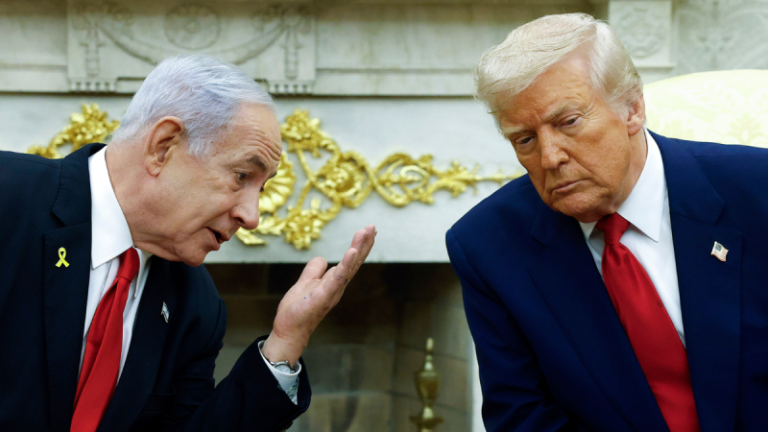Then-Vice President Joe Biden in 2015 told the CIA he would ‘strongly prefer’ an intelligence report documenting Ukrainian officials’ concerns with his family’s ties to ‘corrupt’ business deals in the country ‘not be disseminated’ — and so it wasn’t, according to a newly-declassified email and records made public by the agency.
CIA Director John Ratcliffe declassified the heavily redacted records, which he said he believes is an example of ‘politicization of intelligence.’
Fox News Digital obtained the declassified documents, which were discovered during a CIA review of historical agency records.
A senior CIA official briefed Fox News Digital on the declassified documents and intelligence report, stating that the intelligence was discovered along with an email showing that Biden ‘expressed a preference to not share the report.’
Representatives for Biden did not immediately respond to a request for comment from Fox News Digital.
CIA officials discovered and declassified an email dated February 10, 2016, with the subject line stating: ‘RE: OVP query regarding draft [REDACTED].’ The email was sent to the CIA.
The classification of the email was listed, and crossed out, as ‘SECRET.’
‘Good morning, I just spoke with VP/ NSA and he would strongly prefer the report not/not be disseminated. Thanks for understanding,’ the email states, signed by a redacted name, but with the title of ‘PDB Briefer.’ The ‘PDB’ is the presidential daily brief.
The report in question included intelligence revealing that Ukrainian officials viewed the Biden family’s alleged ties to corrupt business practices in Ukraine ‘as evidence of a double-standard within the United States Government towards matters of corruption and political power.’
‘Intelligence officials agreed that, at the time of collection, it would have met the threshold [for dissemination], but based on the Office of the Vice President’s preference, the information was never shared outside of the CIA,’ the official said.
The CIA, during its review, confirmed that Biden’s request was granted and that the intelligence report ‘had not been disseminated.’
The senior CIA official told Fox News Digital that it was ‘extremely rare and unusual’ and ‘inappropriate to go outside of the intelligence community and inquire with the White House on the dissemination of a particular report for what appears to be political reasons.’
The newly declassified intelligence report, which Biden sought to keep private, had a subject line of: ‘NON-DISSEMINATED INTEL INFORMATION: Reactions of [REDACTED] Ukrainian Government Officials to the Early December Visit of Senior United States Government Official.’
The document states the date of the information came in December 2015. The document was created in 2016.
At the time, Biden was vice president and was running U.S.-Ukraine relations and policy for the Obama administration.
The intelligence document stated that ‘officials within the administration of Ukrainian President Petro Poroshenko expressed bewilderment and disappointment at the 7-8 December 2015 visit of the Vice President of the United States to Kiev, Ukraine.’
‘These officials highlighted that, prior to the visit, the Poroshenko administration and other [REDACTED] Ukrainian officials expected the U.S. Vice President to discuss personnel matters with Poroshenko during the visit, and had assumed that the U.S. Vice President would advocate in support of or against specific officials within the Ukrainian Government,’ the intelligence states.
‘After the visit, these officials assessed that the U.S. Vice President had come to Kiev almost exclusively to give a generic public speech, and had not had any intention of discussing substantive matters with Poroshenko or other officials within the Ukrainian government,’ the intelligence states.
‘Following the visit of the U.S. Vice President, [REDACTED] officials within the Poroshenko administration privately mused at the U.S. media scrutiny of the alleged ties of the U.S. Vice President’s family to corrupt business practices in Ukraine,’ the intelligence states. ‘These officials viewed the alleged ties of the U.S. Vice President’s family to corruption in Ukraine as evidence of a double-standard within the United States Government towards matters of corruption and political power.’
Biden, on Dec. 9, 2015, gave a speech in Ukraine, in which he discussed corruption in the country.
‘And it’s not enough to set up a new anti-corruption bureau and establish a special prosecutor fighting corruption,’ Biden said in the speech. ‘The Office of the General Prosecutor desperately needs reform.’
In that speech, Biden also said Ukraine’s ‘energy sector needs to be competitive, ruled by market principles — not sweetheart deals.’
‘It’s not enough to push through laws to increase transparency with regard to official sources of income,’ he said. ‘Senior elected officials have to remove all conflicts between their business interest and their government responsibilities. Every other democracy in the world — that system pertains.’
At the time, Ukrainian prosecutor Viktor Shokin was investigating Ukrainian natural gas firm Burisma Holdings. Several months later, in March 2016, Biden successfully pressured Ukraine to remove Shokin. At the time Shokin was investigating Burisma Holdings, Hunter Biden had a highly lucrative role on the board, receiving tens of thousands of dollars per month.
Biden, at the time, threatened to withhold $1 billion of critical U.S. aid if Shokin was not fired.
‘I said, ‘You’re not getting the billion.’ … I looked at them and said, ‘I’m leaving in six hours. If the prosecutor is not fired, you’re not getting the money,’’ Biden recalled telling then-Ukrainian President Petro Poroshenko.
Biden recollected the conversation during an event for the Council on Foreign Relations in 2018.
But during his first term, President Donald Trump was impeached after a July 2019 phone call in which he pressed Ukrainian President Volodymyr Zelenskyy to launch investigations into the Biden family’s actions and business dealings in Ukraine, specifically Hunter Biden’s ventures with Burisma and Joe Biden’s successful effort to have former Ukrainian Prosecutor General Viktor Shokin ousted.
At the same time as that call, Hunter Biden was under federal investigation, prompted by his suspicious foreign transactions.
Trump was acquitted in Feb. 2020 on both articles of impeachment against him — abuse of power and obstruction of Congress — after being impeached by the House of Representatives in December 2019.
Meanwhile, the declassified intelligence report had a ‘warning,’ noting that ‘due to the extreme sensitivity, this report should be distributed only to the renamed recipients. No further distribution is authorized without prior approval of the originating agency. Violation of established handling procedures are subject to penalty, including termination of access to this reporting channel.’
It added that ‘any discussion of or reference to information in this report [REDACTED] is strictly prohibited. Any references to this report in derived or finished intelligence should include this warning.’
A senior CIA official told Fox News Digital that Ratcliffe believes the suppression of this intelligence is an example of ‘politicization of intelligence.’
‘Director Ratcliffe believes this is an example of politicization of intelligence that we need to work to eliminate and for what we have zero tolerance,’ a senior CIA official told Fox News Digital. ‘We believe transparency is important. We will release information and avoid any future weaponization of the intelligence community.’
As for the heavily redacted nature of the intelligence report, the senior CIA official told Fox News Digital that the agency was ‘careful about protecting CIA sources and methods with redactions.’
The official stressed that Ratcliffe believes in ‘maximum transparency’ and said he will continue to declassify CIA information and intelligence ‘when it serves the public’s interest.’
Meanwhile, the House of Representatives launched an impeachment inquiry against Biden during his presidency, and found, after years of investigating, that he engaged in ‘impeachable conduct,’ ‘abused his office,’ and ‘defrauded the United States to enrich his family.’
This post appeared first on FOX NEWS










